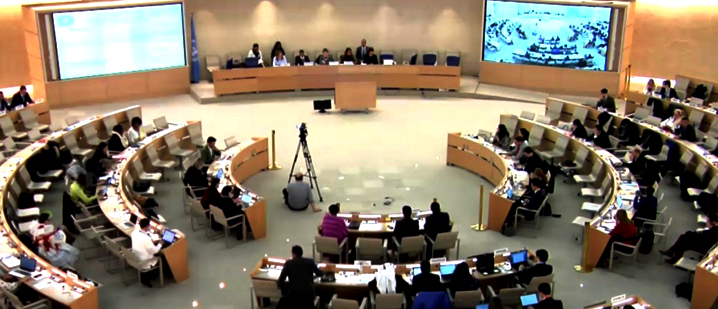Moroccan experience in transitional justice highlighted in an interactive dialogue in Geneva

Secretary General of the National Human Rights Council (CNDH), Mohammed Essabbar took part, on 2 March 2018, in an interactive dialogue on transitional justice held at the 37th session of the Human Rights Council at the Palais des Nations in Geneva (26 February to 23 March).
The Special Rapporteur on the promotion of truth, justice, reparation and guarantees of non-recurrence, representatives of National Human Rights Institutions (NHRIs), international and national organizations and States participated in this interactive dialogue.
During this event, the light was shed on the Moroccan experience in transitional justice and the CNDH follow up work on the implementation of the recommendations made by the Equity and Reconciliation Commission (IER), Morocco’s truth Committee.
In terms of the establishment of truth, the fate of 803 victims of enforced disappearance was revealed, 385 burials were spotted and 185 bodies were exhumed, indicated Mr. Essabbar.
Concerning individual reparation, more than 27,000 victims of serious human rights violations and their rights holders received financial compensation of more than 204 million dollars.
In addition to financial compensation, 1,335 victims and rights holders were concerned with the social reintegration and 18,343 received medical coverage insurance. Also, recommendations were given to the government to settle administrative and financial situations for 540 victims.
Regarding the preservation of memory, history and archives, the CNDH rehabilitated four cemeteries where the remains of victims of serious human rights violations were buried namely in Casablanca (1981), Nador (1984), Agdez and M’Gouna.
Collective (or community) reparation program involved 13 regions in Morocco. A budget of around 16 million dollars was allocated to this program. Within this context, the CNDH monitored the implementation of 149 projects aiming at strengthening the capacities of local actors, preserving the memory, improving people’s living conditions (improving services, developing alternative income-generating activities, and protecting the environment) and the promotion of the rights of women and children.
At the end of his statement, Mr. Essabbar pointed out that the majority of the IER recommendations have been constitutionalized, particularly the criminalization of serious human rights violations including torture, enforced disappearance, genocide, crimes against humanity and war crimes. The Secretary General also declared that the CNDH will soon publish a detailed follow-up report on the transitional justice process in Morocco.























